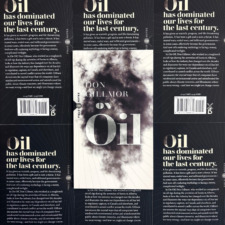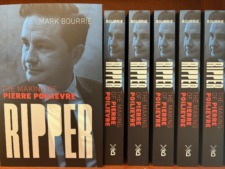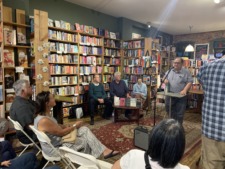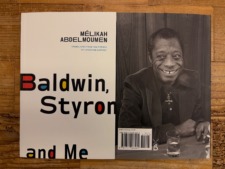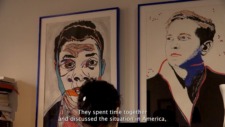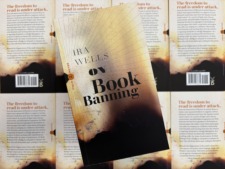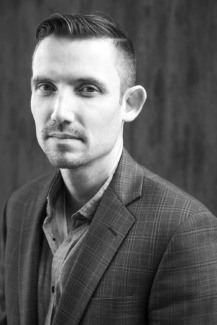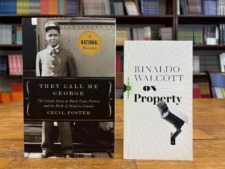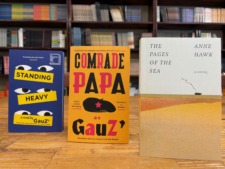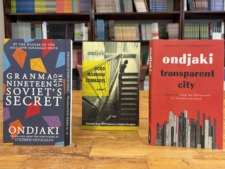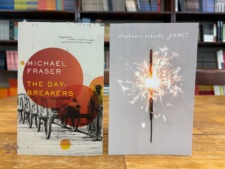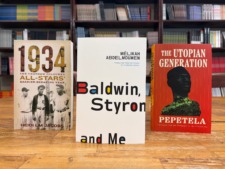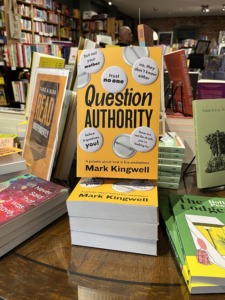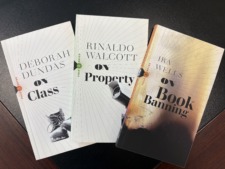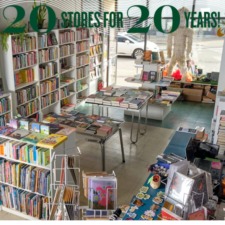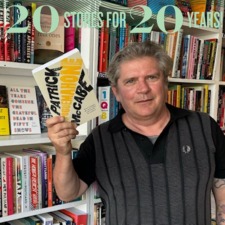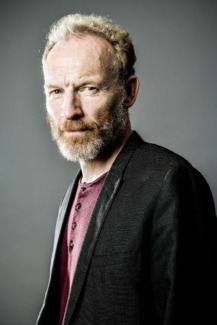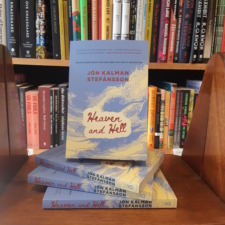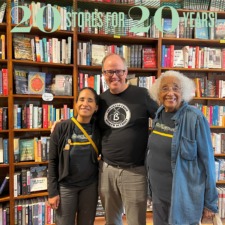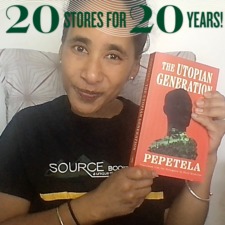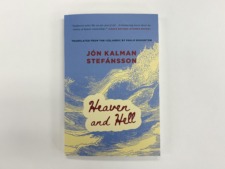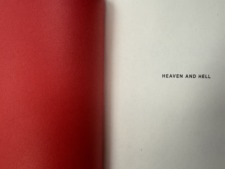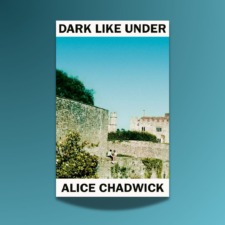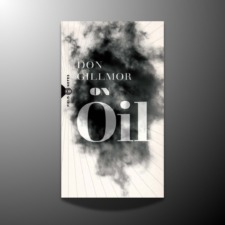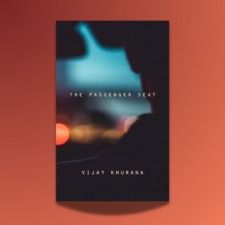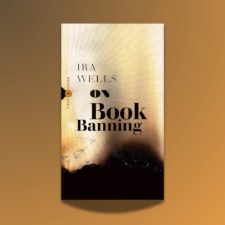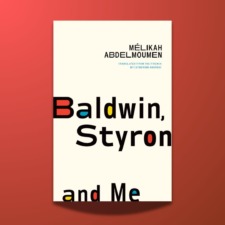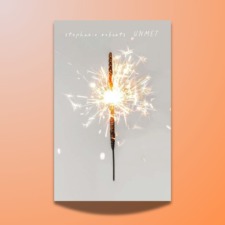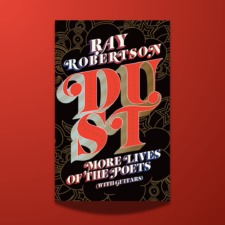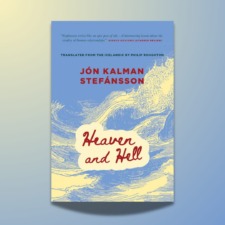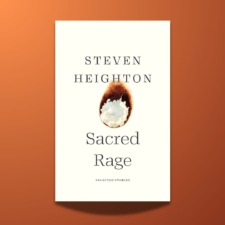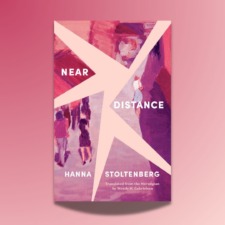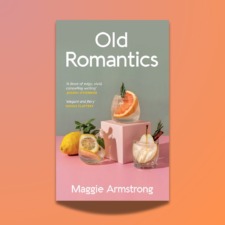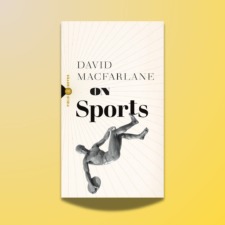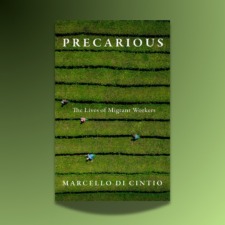Want to get new excerpts, musings, and more from The Bibliophile right away? Sign up for our weekly online newsletter here!
***
I’ve recently returned from my first London Book Fair, an event I found as chaotic, and stimulating, and frustrating, and inspiring, and just plain old fun as Dan had indicated I might. Talking with editors, agents, and translators from all over the world gives me only the paradoxical sense of its smallness: no matter the size of their organization or their territory, the language of their books or the size of the advances their authors command, everyone working in publishing faces a comically similar set of problems practical and existential both. And no matter how fatigued by the whirlwind of interaction or taciturn their sales strategy, it’s easy to get a smile from someone simply by asking about the last book they really loved, or the one they’ve just encountered that they can’t wait to go home and read. Books! We love them! What could be hard about that?
Well, for one, there’s the persistent need to successfully articulate that ardor. There’s no question I find more difficult to answer than “What are you looking for?” And there’s little else anyone wants to know about an acquisitions editor. Poetry’s not, for once, the problem: After reading the hundreds and hundreds of manuscripts submitted during two open submission periods, I’ve settled on “an original and urgent relationship with language.” As anyone who’s encountered a two-year-old knows, the problem with answers is that they beget more questions, so: What do I mean by original? That I’ve never seen it before, or have encountered it only rarely and think there should be more of it. (Thus far no one’s asked what I’ve never seen before, though I would appreciate that level of faith in my clairvoyance.) By urgent: the sense that this utterance had to be made, that the poem is the only way the poet could find to stop speaking, or—and this is what I tend to prefer—the only way to start.
When it comes to fiction, my instinctual answer inclines towards breathtakingly vapid. I’m supposed to be able to specify subgenres and subjects and the sorts of authors I prefer, but the truth is that I just want it to be good, and good . . . I guess I know it when I see it. By the third day of LBF, exhausted by the frenetic pace of my schedule and slightly alarmed by an ill-fitting manuscript I’d just glanced at after feeling confident its representative and I were simpatico, I finally just said to one agent, “I want the sentences to be good.” Luckily she turned out to be a poet as well, and only laughed and nodded and turned straight to a page in her catalog, knowing what I meant.
In our age of malignant certainty, when we have perfected the practice of judging just about everything and everyone we encounter by cover or codification, maybe failures of discernment aren’t the worst sin. But they don’t make for very interesting insight into publishing, and so I’ll beg off answering via poetry once again: “No ideas but in things,” Dr Williams wrote, so let me present this thing. What I’m looking for is Maggie Armstrong and her debut story collection, Old Romantics. This is the first fiction title I acquired start to finish, from soliciting the manuscript to signing the contract. It is simultaneously a book of hideously entertaining—this being the exact descriptor that caught my eye in the catalog of the inimitable Tramp Press, Maggie’s UK publisher—literary short stories, wickedly funny in their honesty about love, sex, family, class, ambition, work, motherhood, and a linked collection with the emotional and narrative heft of a novel.
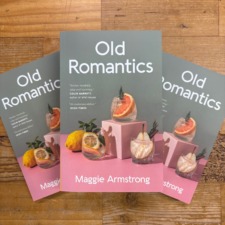
Photo: Old Romantics by Maggie Armstrong. Cover designed by Fiachra McCarthy.
The stories in Old Romantics all concern a woman named Margaret and follow her chronologically, if without strict continuity, through first love, first bad date, first job, first extremely bad date . . . Characters, as well as jokes, recur even as the narration switches between first and third-person. These are stories—and a heroine—that doggedly insist on Romantic, and romantic, ideals, yet repeatedly defer to the illusory nature thereof with cold-eyed Modernist clarity, and then leap agilely into a postmodern metafictional mode to arrive at an unvarnished and complex portrait of a single woman trying to understand, and to be, exactly who she is. It’s a Künstlerroman unlike any I’ve read before, about a female artist who must first come of age, and then to terms, with the life she’s been assigned by virtue of her gender: only after all of that can she come to her calling. It’s a trajectory little described, perhaps very well because so many women who aspire to lives in the arts are derailed along the way, and in Armstrong’s hands it is moving and funny and a triumph of invention and simple determination.
Did I mention funny? Witness fictional Margaret struggling with her prose style whilst the real Maggie demonstrates an incomparable metafictional wit (emphasis mine): “I found the sight of such bland sentences distressing—they all began with I, and ended me—and slammed the notepad shut as if its contents had offended me”. “It was a lightweight story I was working on,” Margaret continues, “to do with infantile and everyday desires, a slow descent into disappointment, with attempted anal penetration at the close.” The marshalling of syntactical expectation as the list progresses from the benign to the shocking, the soft chime of rhyme (slow / close; infantile / anal), the trochaic crescendo of “anal penetration at the close” to end the sentence, combine in an intelligence, ironic wit, and musicality I can’t ever seem to get enough of. In another story, a youthful Margaret makes some bad decisions and finds herself alone with a more experienced, intoxicated and/or unscrupulous man, a confusion of agency and passivity that Armstrong articulates through a blackly comic grammatical enactment: “This had taken place. Patch had had sex with me.” And throughout, brilliant description and metaphor abound: “A fluffy female bathrobe hulked around the door”; “She gazed back at him like a sedated hawk”; “Her chest banged like a broken toy.”
What am I saying here? The sentences are good. Really, really good. They are what I’m looking for, and I couldn’t be more proud that we can call them ours.
Vanessa Stauffer,
Managing Editor
***
Old Romantics comes out on Tuesday—just in time for April Fools’ Day! To celebrate the upcoming release, here’s publicist Ahmed with an interview with Maggie Armstrong.
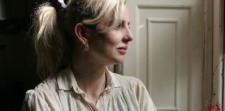
Photo: Maggie Armstrong. Credit: Bríd O’Donovan.
A Biblioasis Interview with Maggie Armstrong
Can you tell me a bit about yourself and how this collection came about?
Well I have been writing short stories for about ten years, possibly fifteen. I used to perform at spoken word things around Dublin, but I was working as a journalist at the time. It wasn’t until 2020 that I actually started to publish stuff. This book came about from those short stories. A publisher came to me, had read one in a magazine called Banshee and asked if I had any more. That was Sarah from Tramp Press and that led to this collection.
I heard you had made some changes to the stories since the collection was first published in Ireland last year. Could you tell me about that?
Oh, sure. I was sort of thinking they’d be subtle changes that nobody would notice. They were so subtle.
So why did you make them anyway?
Because I’m never happy with anything. I will perennially rewrite everything. I feel terrible for editors that I’ve worked with. It feels like I’m disregarding all of their hard work and insights, but I just can’t help myself once I get my hands on something. A text seems to read differently and sound differently every time you look at it.
I knew that while I was revising it that it was sort of fruitless because I’ll never be happy with a published book. I like getting up and reading stories and I always change words here and there every time I read something live. A text remains malleable to me forever.
How would you define an old romantic?
An old romantic is a damn hapless fool who continually authors their own destruction by way of repeated mistakes and self-delusion. Or a fantasist who’s swallowed a love potion and been let loose on the town. This kind of character is not great to have in your personal life, but it’s a rich study for fiction.
I can see that in Margaret. A lot of the stories seem to test Margaret’s sense of reality with her ideals of romance. What kind of role does romance have in Margaret’s life and what does this say about her?
I think romance drives all of her actions and appetite. It dictates her decisions and it often robs her of agency. Feeling controls her rather than thought. Some of us are driven by a feeling rather than by practical considerations, which can be interesting to examine. To follow the path of a life somehow enslaved to desire and feeling and what possibly amounts simply to dopamine, the hormones, the chemicals that are sometimes leading us one way or another.
What kind of change do you see in Margaret as the stories progress?
There’s a book that I really adore by Elizabeth Bowen called The Death of the Heart. It was published in 1938 and it’s to do with a young woman called Portia whose life is on the margins and who moves to London and falls in love and is jilted and rejected by her much older lover and she has to grow up overnight and realize just how cold and hard this world is. And I think that happens to the anti-hero of my book. The heart is shattered halfway through. We see as soon as Walls comes on the scene, he’s a real menace to her belief system, and he really dismantles this fairytale of being swept off her feet. He dismantles it and leaves her high and dry and puts her life at risk in a speeding car. He is a destructive person given to extremes. That’s when we see a change happen. I think the axis turn of those stories is pivotal. Once there is a situation where there is control and cruelty in a relationship, nothing is ever going to be the same. And then of course our protagonist goes from out of that frying pan into the fire of Sergio who she has her children with.
It’s like the labyrinth, or the snake pit, where you go in and cannot find your way out. You know the Minotaur?
The myth where Theseus goes down into a labyrinth to fight the creature?
Yes, exactly. In the underworld of dates and liaisons this book tries to depict, I feel like it’s all Minotaurs and all monsters and there is a maze you’re trying to get out of. Romance is a season in hell from which you emerge a broken and changed person. Oh, that sounds so terrible.

I’m wondering if you could also speak about the form of these stories and the genre of autofiction in general. These stories obviously invite comparisons to your own life, but they also take metafictional turns with sly comments from the narrator or characters acknowledging that this is fiction. It’s a unique take on the genre.
I love a first person voice. I love the intimacy and the immediacy of slipping into someone’s consciousness like that, and indeed unconscious, and moonlighting as them. I have just adored, and maybe I shouldn’t even start mentioning names because then I can get carried away, and I have mixed relationships with all of them, and these aren’t necessarily my influences, but I’ve loved Annie Ernaux, Rachel Cusk, Deborah Levy, Ben Lerner. I’ve loved Karl Ove Knausgaard and the whole phenomenon of the life saga that he put on paper. That great project of oversharing that he went about really struck home with so many people.
I was never able to write a story until I did it in a first person voice. I had tried out the omniscient narrator thing and it went very badly. It always read like some Edna O’Brien pastiche, like I was just copying from my literature textbooks. The first person felt more like a guilty pleasure and I never believed anyone would publish it. I never thought it was something that anyone would take seriously. I felt it was somehow frowned upon in literary circles to write autofiction because maybe there’s an assumption that if you can only write your own story that you lack empathy, that you’re not able to imagine what other lives and communities are like, or maybe that you lack imagination because you simply can’t think of any other plots. Or just that you’re in love with yourself, because you find yourself so fascinating that you would genuinely be content to spend your entire day narrating your own life.
So all of these felt like obstacles to calling this real work. Then I just went for it. I thought to hell, I’m really enjoying writing this. And the finished product has no resemblance to my own life. It may be inspired or be drawn from it and the only reason for that is because I have pure unrestricted access to my own experience and consciousness. I can access it just sitting here and through my extremely unreliable memories and notebooks. It’s all there and it’s very rich material I find. I’ve always found life hard. It never came naturally to me, just being a person in the world. I have often gotten into scrapes and funny situations. I was exhausted by just my own escapades or my own sagas that I just thought: listen, at least I can get a bit of copy out of them.
I suppose writing more what you’d call autobiographical fiction is a bit of a highwire act. And it’s a dark art. I can’t vouch for the ethics of fictionalising the real, as opposed to pure invention. You have to be very careful what goes in your stories and what stays out. I’ve learned just because something terrible happened does not mean that it’s fair game for fiction.
You say you could only start writing in the first person, but some of the stories are in third person. Why the switch for some of them?
Honestly, I became disturbed by the material that I was reading. I no longer wanted to be associated with the author of these stories and did not like the tone I was taking. I felt particularly the story “Trouble” where you have extraordinary upheaval and cognitive dissonance, with a young woman, aka my fictional alter ego Margaret, who’s having an affair with a real charlatan and at the same time entering into a very serious relationship with a highly unsuitable married father of two. Reading this kind of dark testimony, it was like the room started to turn. I felt I couldn’t any longer inhabit this voice because it was all just so odd. The narrator’s level of dislocation from her actions did not feel honorable. So in order to process it in the form of a story, I needed to tell it in the third person. Does that make any sense?
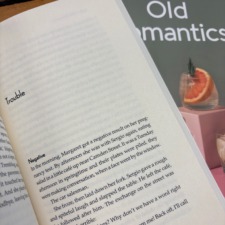
Photo: First page of “Trouble” in Old Romantics.
Almost like you needed some distance to really be able to tell it?
Then even the distance of the third person didn’t feel quite right. The protagonist’s name is Margaret so clearly some of these things kind of almost happened to me, but then that’s weird to talk about yourself in the third person. Children talk about themselves in the third person, and mad Shakespearean characters. It was just an odd voice. That’s not to say I’m admitting that these are entirely myself. It’s a very distorted claustrophobic universe which happens to be very familiar to me and similar to the tiny universe of Dublin where I’ve lived my whole life.
Also there’s something about an “I” voice that’s hard to pull off, where you have to remain sort of likeable to your reader and vaguely charming to hold their attention and keep their commitment to the book. The kind of stuff Margaret was up to was not likeable nor commendable.
Margaret also spends a lot of time trying to be a writer and thinking about all these important authors. The classic Irish ones (Joyce, Beckett, O’Casey) and the Russians (Dostoevsky, Chekhov). But she seems disenchanted with them or maybe just the idea of them. What kind of influence have they had on you?
All of the big books that appear in these stories come in for a reason. I grew up with parents who read constantly and voraciously, particularly my mother. Her face was behind a very big book as she sat on the sofa most of my childhood, or she was howling laughing or reading passages aloud. Her favourite outlet from her four children was going to her book club. We grew up reading a lot and time was frittered away with literature.
Then I went to study English, and I had quite a lot of attention difficulties at school. It was a very odd choice to go do something academic because I love doing practical things and I always struggle to sit at a desk, but I read English for four years at Trinity. Nothing but books. Weighted and crushed by books. I have to a comical degree been haunted by books my whole life.
Both of my parents died in the last few years and we recently dismantled their bookshelves, which was a very sad and truly physically demanding job. Carrying boxes of books with my children buckled in the back and trying to manage everyone and all the books. I continue to not know how to keep track of books everywhere I go. This is kind of long-winded, but I’m not sure how to see that whole tradition of Western literature now and the great doorstoppers that we grew up with. They were written by men of letters, let’s say Tolstoy, Dostoevsky, Dickens, who had no domestic responsibilities, who likely had servants, maids, cooks, secretaries in some cases. They didn’t have the internet, they had few distractions and the intricacies of their sentences within these formally robust paragraphs testify to that. I’m just interested that the novel form has held for so long and that we’re still expected, while our lives are so fragmented in so many ways, and our attention is so divided and splintered, we’re still expected to make sense of the world through the bastion of the novel, a form which was invented in far more fallow circumstances.
Is that why you chose to write linked short stories as opposed to a novel? I suppose people could read this as a novel, since it follows the same character, but they are distinct and also stand on their own.
Yeah, they’re great for short attention spans. A short story is perfect for the age of TikTok, a platform I have never in my life even glimpsed. I’m too distracted by other things. But I think the short story form sort of chose me. Many writers of course begin with short fiction in their apprenticeship. Same as with any craft. My nephew is studying carpentry at school—he started by making a spice rack, not a bed or a cabinet. I will one day soon make a cabinet, I’m sure of it, but I would never have got anywhere with a project more mammoth than a spice rack. Actually I was doing both short stories and novels at the same time, I’ve written two novels that I’m never going to publish, they ended up so unhinged and full of plot holes. With stories you can free yourself of the wider responsibilities of world-building. Then it was just a happy accident that Old Romantics turned out to be a linked collection. One of my fears was that all the stories were all similar and had a similar emotional thrust and that the same character was recurring. They all had the same obsessive, monomaniacal quality. And actually, that turns out to be not the worst thing about it. That’s what has really hit home with a lot of people. People enjoy tracing the adventures of short story characters as much as they do those of any series. I mean I really love John Updike’s Maples stories, Jenny Zhang’s Sour Heart, Alice Munro’s The Beggar Maid, all linked collections.
What are you hoping people take away from reading these stories?
I hope people take nothing but a pleasant memory of being lost in a book briefly.
***
In good publicity news:


